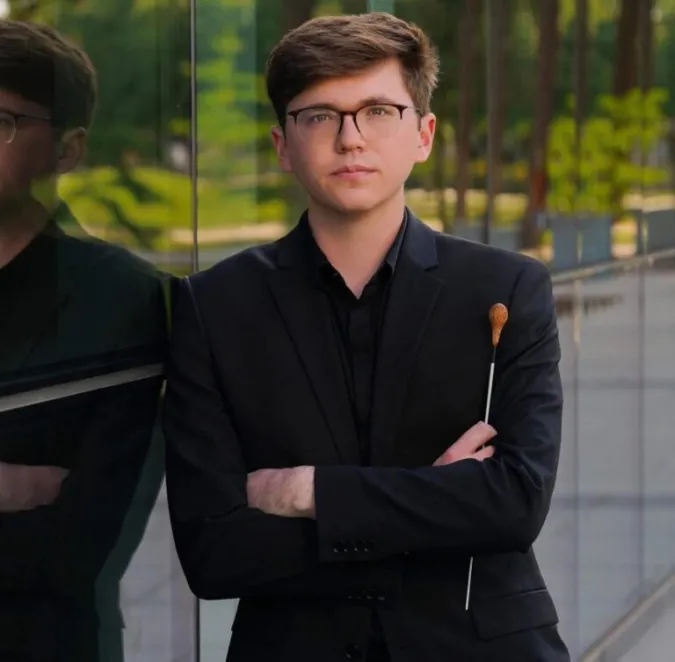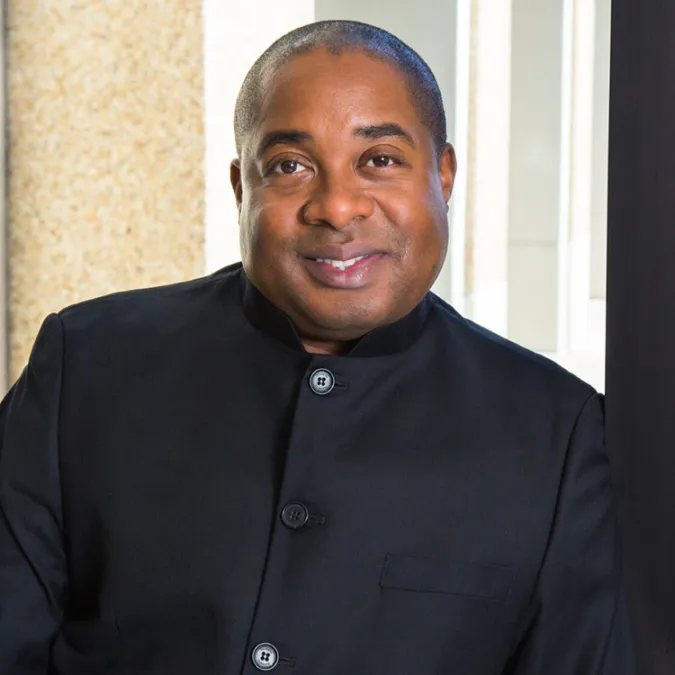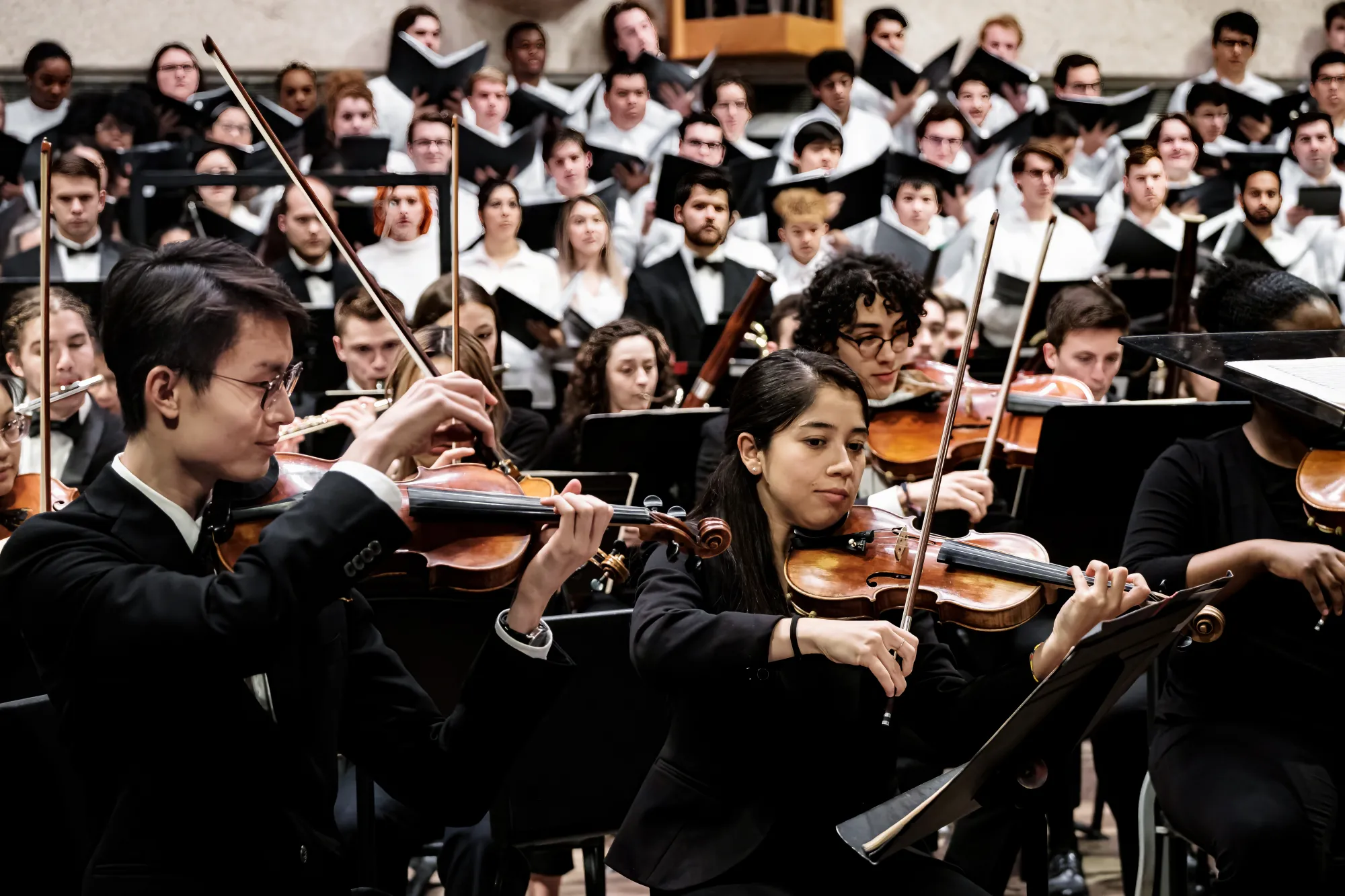Cliff Croomes, conductor
This concert will last about 50 minutes without intermission.
Please silence your electronic devices.
Photography, video, or recording of any part of this performance is prohibited
Program
Jan Van der Roost
Flashing Winds
Aram Khachaturian
arr. Moreau
Adagio of Spartacus and Phrygia
Kamran Ince
Nihavent Longa
Malcolm Arnold
trans. Johnstone
English Dances, Set 1, op. 27
Andantino
Vivace
Mesto
Allegro risoluto
Florence Price
arr. Williams
Adoration
Alec Rodriguez, guest conductor
Gioacchino Rossini
arr. Cailliet
L’italiana in Algeri
About the Program
Program notes by Mark Bilyeu
Jan Van der Roost
Flashing Winds
Born 1956, Duffel, Belgium
Composed 1989
Duration 4 minutes
Belgian composer, conductor, arranger, and educator Jan Van der Roost studied at the Lemmens Institute in Leuven and the Conservatories of Ghent and Antwerp, he went on to hold positions in counterpoint at his alma mater, the Lemmens Institute, where he is now the honorary conductor of its wind ensemble. With a catalogue of nearly 100 works, his musical language is highly eclectic, as he pulls inspiration from 16th century dance music, to modern day jazz idioms. Flashing Winds was commissioned by the “Het muziekverbond van West-Vlaanderen" (the Music Association of West Flanders), and is dedicated to Belgium’s Arlequino Youth Band, who premiered the work.
Aram Khachaturian
Adagio of Spartacus and Phrygia from Spartacus
Born June 6, 1903, Tbilisi, Georgia
Died May 1, 1978, Moscow, Russia
Composed 1954
Premiered December 27, 1956, Mariinsky Theatre, Leningrad
Duration 9 minutes
Aram Khachaturian entered Moscow’s Gnessien Musical Institute as an 18-year old with no musical training. Fifteen years later, his piano concerto established him as a leading Soviet composer: a title he took seriously. After further successes of his symphonic music, and a violin concerto which was awarded the Stalin Prize — the highest recognition for artistic achievement in the Soviet Union — Khachaturian took a leadership position with the Union of Soviet Composers and was heavily involved with the group until his death. His ballet scores, Gayane (1942) and Spartacus are considered the first Armenian ballets, and continue to shine as standard repertoire today. Writen in the post-Stalin era, Spartacus was awarded the Lenin Prize in 1954, but the ballet was not premiered until 1956. In it, Khachaturian tells the story of Spartacus, a Thracian gladiator and slave who, along with several others, leads a revolt against the Roman Republic, resulting in the Third Servile War. While Spartacus and the rebellion he led are historical, for his ballet, the composer took several liberties, and imagined a wife for Spartacus, naming her Phrygia. The couple is captured by the Romans, and then separated: him to the gladiator ring, and her to the harem of the Roman leader Crassus. After being forced into a battle-to-the-death with a friend, Spartacus incites a rebellion and escapes with Phrygia. The Adagio of Spartacus and Phrygia is the music depicting their reunion. The next morning, Crassus and his army locate the encampment and (spoiler alert) take Spartacus’ life, impaling him on their spears, and leaving Phrygia to mourn his death.
Kamran Ince
Nihavent Longa
Born May 6, 1960, Glendive, Montana
Composed 2006
Premiered February 27, 2007 Netherlands Blazers Ensemble, Ankara, Turkey
Duration 4 minutes
The energy and rawness of Turkish and Balkan music, the spirituality of Byzantium and Ottoman music, the tradition of European art music and the extravert and popular qualities of the American psyche are the basis of Kamran Ince’s sound world. Born in the United States, his family moved to Turkey when he was six where he began his musical studies, until moving back to the U.S. to train at some of the nation’s top conservatories. Ince serves as professor of composition at the University of Memphis as well as the Center for Advanced Studies in Music at the Istanbul Technical University, an institute he co-founded in 1999. He has been awarded international prizes, including the Rome Prize, a Guggenheim Fellowship, the Lili Boulanger Prize, and the Arts and Letters Award in Music from the American Academy of Arts and Letters. His work Nihavent Longa is a very popular, fast Turkish instrumental dance song in the nihavent scale (called ‘maqam’, and similar to the harmonic minor scale of Western music). Longas are of Thracian origin (the portion of Turkey that is in Europe) and generally in a simple meter. Although the tune is anonymous, it is occasionally attributed to Turkish composer Kemani Kevser Hanim (1887-1963). Kamran Ince’s version of Nihavent Longa was commissioned and premiered by Netherlands Blazers Ensemble on the occasion of Queen Beatrix’s state visit to Ankara, Turkey.
Malcolm Arnold
English Dances Set 1, op. 27
Born October 21, 1921, Northampton, England
Died September 23, 2006, Norwich, England
Composed 1950 (arr. Maurice Johnstone 1965)
Duration 9 minutes
It was a chance meeting with Louis Armstrong that set the twelve-year-old Malcom Arnold on a sixty-year career path. The young man was on vacation in Bournemouth on the southern coast of England, where the famous jazz trumpeter was also vacationing in the middle of a European tour. After hearing Armstrong play, Arnold took up the trumpet, and five years later, won a scholarship to study at the Royal College of Music in London. At the age of twenty, he was appointed second trumpet with the London Philharmonic Orchestra (LPO), and two years later, was promoted to principal trumpet, all but solidifying his position as one of the best trumpet players of his generation. A registered conscientious objector to World War II, Arnold joined the military service only after the death of his brother in 1944. Having been placed in a military band, however, he shot himself in the foot (literally), and returned to civilian life with the LPO until departing in 1946 to pursue his composing career full-time. His output as a composer is prodigious: nine symphonies, twenty concerti, and over one hundred film scores (including The Bridge On the River Kwai, which won him a 1957 Academy Award). He also wrote six dance suites: Irish, Welsh, Cornish, Scottish, and two English Suites. While listeners might assume each movement is taken from an old folk song or melody heard along the countryside, each theme is a creation of the composer, and has no historical significance. Malcolm’s unique compositional voice is rooted in his ability to utilize jazz, pop, and even rock idioms to create music that always feels familiar. This caused some to dismiss him as a composer of ‘light music,’ and one radio announcer to describe Arnold as a victim of "the curse of popularity.” Whether a blessing or curse, the composer was knighted in 1993 in recognition for his contributions to British music, and in 2004 was recognized by the Incorporated Society of Musician’s Distinguished Musician Award “for his lifetime’s achievements as one of the greatest composers of the 20th century.”
Florence Price
Adoration
Born April 9, 1887, Little Rock, Arkansas
Died June 3, 1953, Chicago, Illinois
Composed ~1951
Duration 4 minutes
“My dear Dr. Koussevitzky, To begin with I have two handicaps — those of sex and race. I am a woman; and I have some Negro blood in my veins.” This was the opening line written by Florence Price in a 1943 letter to the highly influential conductor Serge Koussevitzky. This letter, which never garnered a response, came ten years after the Chicago Symphony Orchestra performed her Symphony in E Minor at the 1933 Chicago World’s Fair. This performance earned her the distinction of being the first African-American woman to have her music performed by a major symphony orchestra (the conductor Frederick Stock being considered much more progessive than the traditionalist Koussevitzky). Born in Arkansas, Price attended the New England Conservatory — one of the few schools which accepted African American students — and returned to Arkansas where she taught at the university level. Concerned with the escalating racial tensions under Jim Crow, she and her family moved to Chicago in 1927, where Price’s career flourished. After a divorce from her husband, she moved in with composer and pianist Margaret Bonds, which led to relationships with other influential Black artists of the day including Marian Anderson, Roland Hayes, and Langston Hughes. Originally conceived as a work for solo organ, Adoration was one of the last works Price wrote, but hearkens back to Price’s early work as an organist accompanying silent films. As critic and author Alex Ross writes, despite an impressive output of over 300 works, “[Price] is mentioned more often than she is heard,” a fact which is only now beginning to be remedied.
Gioacchino Rossini,
L'italiana in Algeri
Born February 29, 1792, Pesaro, Italy
Died Nov 13, 1868, Paris, France
Composed 1813
Premiered May 22, 1813, Teatro San Benedetto, Venice, Italy,
Duration 8 minutes
At the age of 21, Giachino Rossini had already written five operas; by the age of 40, he was to write a total of thirty-nine operas before taking his ‘opera retirement’ and turning to sacred works, salon pieces, and his culinary experiments (pasta alla Rossini is, after all, his creation!). It’s easy to understand how Rossini was able to crank out so many operas when we consider the pace at which he worked. He stated that his melodramma giocoso (playful melodrama) L'italiana in Algeri was completed in 18 days (although other sources claim it took him a whopping 27), which is a shocking speed that would have impressed even Mozart. The overture to the opera is everything we’d expect from Rossini: dynamic surprises, manic vitality, and memorable melodies which introduce the madcamp romp that will follow.
About the Artists
Alec Rodriguez

Alec Rodriguez is a conductor and music educator currently pursuing a Doctor of Musical Arts in wind band conducting at The University of Texas at Austin, where he serves as a graduate assistant with the University Bands. In this role, he assists with all aspects of the wind band program, including conducting, ensemble administration, and undergraduate teaching support, while continuing to develop his scholarship and artistry. Prior to his doctoral studies, Rodriguez served as the associate director of instrumental music at Clovis High School in Clovis, California from 2022 to 2025. There, he conducted the Symphonic Band and String Orchestra, led all aspects of the percussion program, and was responsible for logistical operations including instrument inventory, transportation management, and facility coordination. From 2019 to 2022, he taught at Independence High School in Bakersfield, California, where he directed the Symphonic Band, led the school’s competitive marching band, and served as director of the Indoor Percussion Ensemble, guiding the group to a first-place finish at the 2022 WGI Merced Regional in Open Class. Rodriguez earned his Master of Arts in music–conducting from California State University, Fresno, where he also earned a Bachelor of Music degree in Music Education.
Cliff Croomes

Cliff Croomes serves as the associate director of bands and director of the Longhorn Band at The University of Texas at Austin. Prior to this appointment, Croomes was the assistant director of bands at Louisiana State University and the music director and principal conductor of the Civic Orchestra of Baton Rouge. Previous to his appointment the faculty he studied at LSU for his Master of Music and Doctor of Musical Arts degrees. Dr. Croomes earned his Bachelor of Music Studies from The University of Texas at Austin and is an alumnus of the Cavaliers Drum and Bugle Corps from Rosemont, Illinois. He has performed with ensembles throughout the United States, London, Paris, Switzerland, Germany, Italy and consulted throughout Japan. Dr. Croomes holds an endorsement with Innovative Percussion Inc. and is a founding board member of the composer diversity initiative “And We Were Heard” as well as a member of the Dr. William P. Foster Project advisory board. Croomes also holds an honorary membership in Kappa Kappa Psi.
Symphony Band
Flute
Gerardo Ayala
Cameron Farley
Zachary Gray
Chan-hee Kim
Holly Livingston
Oboe
Rachel Marquez
Tara Tran-Huu
Clarinet
Toby Acfalle
Georgia Castillo
Emely Flores
Michael Golston
Thompson Le
Lyna Mai
Adelyn Rusli
Bassoon
Elijah Bergstrom
AB Brown
Naomi Kitamura
Darren Tea
Saxophone
Ben Crowley
Austin Davidson
Nigel Duplessis
Brandon Kusaj
Chantal Lee
Sam Stricklin
Horn
Benjamin Cummings
Zachary Greer
Tomo Umetani
Ashley Young
Trumpet
Brett Harrington
Christopher Ray
Trombone
Jan Campos
Nicholas D’Andrea
Antonio Gamez
Joshua Gault
Hunter Irwin
Hudson Pedrotti
Landon Reimer
Benjamin Valliere
Konner Wetterstrom
Euphonium
David Barragan
Casey Hawthorne
Andrew Shaffer
Tuba
Carter Eason
Jeffrey Fields
Samantha Yanez
Percussion
Jaqueline Garcia
Victoria Garcia
Daniel Hernandez
Ty Keller
Caleb Koscinski
Jacob Laguna
Joel Rodriguez
Harp
Anjali Shivkumar
Alyssa Vought
Double Bass
Reilly Curran
Electric Bass
Michael Lebrias
Keyboard
Mingchen Chu
Upcoming Events

Mahler Symphony No. 2, Resurrection
Symphony Orchestra & Combined Choirs
Leah Crocetto, soprano
Sophio Dzidziguri, mezzo soprano
One of the most beloved symphonies in the canon, Mahler's "Resurrection" symphony boasts a large orchestra, mezzo and soprano soloists, and similarly to Beethoven's 9th Symphony, a large choir in the final movement. For this performance, the Butler School's Concert Chorale and University Chorus ensembles will join forces; they will be joined by Butler School alumni singers and community choral singers from around Austin.
Tuesday, March 31, 8:00 p.m.
Long Center for the Performing Arts
WIND ENSEMBLE
Sunday, October 12, 4 p.m.
Bates Recital Hall
WIND ENSEMBLE
MORE MUSIC OF JOHN WILLIAMS
Wednesday, November 5, 7:30 p.m.
WIND SYMPHONY
Sunday, November 9, 4 p.m.
Bates Recital Hall
SYMPHONY BAND
Wednesday, December 3, 7:30 p.m.
Bates Recital Hall
Event Details
Free admission


